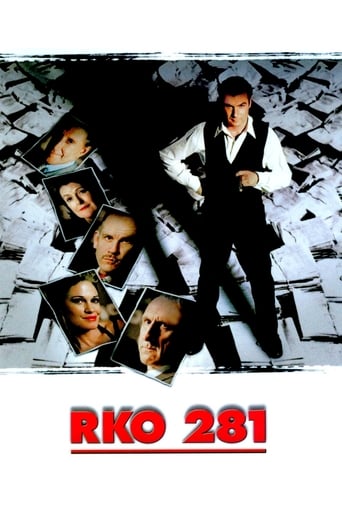

Orson Welles (Liev Schreiber), all charisma and stubborn vision, is signed to direct films for RKO Pictures with a startling amount of creative freedom. Welles decides to make production number 281 a disguised biopic of media tycoon William Randolph Hearst (James Cromwell), a film which would come to be known as "Citizen Kane." But Welles doesn't understand just how much clout Hearst yields. When he gets word of the unflattering production, Hearst does everything in his power to stop it.The power of this film is how "Money and Power" can crush art which makes this scary. The main focus of the film is what "Is Right" what is "Wrong"! This film reminds me when Universal had a fight with religious groups about the film "The Last Temptation of Christ" What is also "Said without being said" is "You Can Win the War" but there is also a price! You pay the price but so does your opposition
... View MoreA better film would no doubt have spent much more time on dissecting what makes the two key protagonists - Welles and media magnate Hearst tick, but RKO281 barely seems to scratch the surface, coming up with only superficial reasons for each character's stubborn intransigence, but this is still a pretty good examination of the story behind the production of what has since come to be widely regarded as the greatest film ever made.Liev Schreiber lacks the boyish exuberance of the 25-year-old self-proclaimed genius but is adequate in the role and is hampered by a script that refuses to reveal too much about his character beyonds its pertinence to the making of the film. But then, this isn't a biopic about Welles so perhaps it's unfair to be too critical on that score. James Cromwell scores much higher as William Randolph Hearst, a ridiculously wealthy man whose obsession for material things as a way of compensating for his own perceived shortcomings resulted in both his downfall and the release of Welles' classic. The script, after first introducing him as some sort of tyrant (Welles compares him to Hitler in a key speech to the RKO board), eventually becomes more sympathetic towards him. What Hearst tried to do back then is probably no different to what a high-profile individual would attempt now were they discover a film highlighting some of the most intimate aspects of their life - upon which it shines a damning light - would do. Only today, the production would become mired in a sea of lawsuits that would see its release either permanently delayed or held up until the death of the person in question. The two men's encounter in a lift after Welles has emerged seemingly victorious from their scrap does a good job of putting into context the cost of the battle to both of them.The Marion Davies character, played here by Melanie Griffith, is probably the most sympathetic of the lot. The fact she remained with Hearst until his death a decade after the events depicted in the film suggests there was more to their relationship than the allure of otherwise unattainable wealth and beauty and this is an aspect that the film doesn't overlook.I don't know how accurate this depiction of the events surrounding the making and release of Citizen Kane are, but it provides a fascinating glimpse behind the scenes nevertheless, neatly placing the events into context with the larger world view of impending war and depression. Definitely worth a look.
... View MoreThe story of RKO 281 would be even more incredible to me, as one who considers Citizen Kane (the film that this film is mostly about), if not for seeing the documentary "The Battle over Citizen Kane". That documentary not only covers the 'battle' that ensued over William Randolph Hearst and Orson Welles over the film and if it would even see the light of day, but also their histories, which makes for a lot of interesting viewing. So, the dramatization does leave some things out on that end, however the filmmakers make up for it with a compelling re-telling of events (if some of them are loosely based on or made up from the original facts, that's forgivable), and a really good cast at the helm.The most crucial things on the outset with a film like this, therefore, are making sure the actors who fit into Welles, Hearst, and also others in the story like co-screenwriter of 'Kane', Herman Manciewicz, and Heart's lover, are portrayed with enough believability. Here we get Liev Schrieber in Welles, James Cromwell as Hearst, John Malkovich as 'Mank', and Melanie Griffith, and they're all terrific in the roles, all disappearing into their characters. Schieber especially was convincing in the legendary Mercury theater man, able to express his strengths, his weaknesses, his outbursts, and his passions just right. On the flip-side, Cromwell knew every step of how to play Hearst, this cold, ridiculously wealthy giant who ruled over his lover and anything his reach could touch. Malkovich, as well, is great as always.The style of the film is fairly basic, but it is intriguing how the director Benjamin Ross and screenwriter John (The Aviator) Logan work out the story logistics. The first half is all about the making of 'Kane', the struggles of the collaboration of the screenwriters, the obsessiveness to perfection that Welles had in production. Then it moves to the second half, which brings the greater conflict- how did this film, which was "loosely based" on the bits and pieces of life in Hearst's life, get to the screen in 1941? The details behind it won't be of any surprise to those who know the story, but to those who don't it becomes a fascinating tale of conflict, loss, and pride over an art form. In fact, as a TV movie (not to downgrade television) it works very well, far deserving of the awards it received. As pure cinema, it is a little pale at times, and reaches for the drama as much as Welles did. Overall, it is definitely worth a look if you're a fan of the film, or if you're not.
... View MoreThe most remarkable thing about RKO 281 (subtitled "The Battle Over Citizen Kane") is that not only is it sympathetic to William Randolph Hearst and his paramour Marian Davies, but it also paints a less then flattering picture of film icon Orson Welles.Every film buff worth his popcorn knows, or at least should know, the legend of CITIZEN KANE: Welles, the brilliant, but naive Boy Wonder, takes Hollywood by storm with his amazing and groundbreaking first picture, but falls victim to the tyranny of the cruel, thin-skinned billionaire Hearst, who tries to destroy the brilliant work of art. It is the David and Goliath saga of Tinseltown, with an art triumphs over commerce subtext. But the makers of this made-for-cable drama have opted to pull a switcheroo. Just as Welles bravely (or foolishly) challenged the legendary tycoon Hearst, RKO 281 rather courageously takes on the Welles legacy of the misunderstood genius. The results are gratifying, though the facts end up blurred all the more. If there is, indeed, a villain in the whole CITIZEN KANE affair it would be screenwriter Herman J. Mankiewicz (played here by John Malkovich), who acted as Judas to W.R. and Marian, while serving as Iago to Welles's Othello. It was, according to historians, Mankiewicz who took a catalogue of firsthand observations and casual gossip gathered as a favored houseguest of the Hearst household and fashioned it into an unauthorized biography/screenplay. And it was Mankiewicz who goaded Welles to flirt with professional suicide by pursuing the project in the first place and by changing a film about a generic millionaire into a tale rife with details specific to Hearst. But RKO 281 ventures a different theory, suggesting that Welles devised KANE as an elaborate weapon of revenge against Hearst for having been insulted at a dinner party. One suspects that Welles' crime was more one of clueless indifference than vengeance, but the latter does make the film more dramatically provocative. Whatever the case, Welles clearly bit off a much bigger bite than he anticipated when he deemed Hearst's personal life fair game. Ironically, Welles' folly may not have been his audacity to attack Hearst, who surely faced greater critics, so much as the director's unintended assault on innocent bystander Davies. What RKO 281 highlights is that much of Hearst's ire against KANE was based to his desire to protect Davies from an unflattering portrayal and public scandal; not an unfounded fear, it would appear. In KANE, Hearst is presented in a mostly sympathetic light, and it is Davies who comes off the worst. Indeed, her alter ego, Susan Alexander is the film's least likable and empathetic character, an exceedingly dumb blonde who evolves into a shrieking, untalented alcoholic has-been diva. No other character in the film is as cruelly one-dimensional. Ironically, it may have been Mankiewicz's gallant, albeit foolish, attempt to protect his friend Davies, that caused all the problems. By making Susan so extremely different from the much beloved Davies, Mankiewicz may have thought people would see Alexander as a pure fiction. But such is the power and fame of KANE that then and future generations were destined to accept the legend over the reality and assume that Susan and Marian are one in the same. (Further irony: RKO 281 finds Marian played by a very Susan Alexander-like Melanie Griffith.)Though the film notes the irony of the muckraker publisher suddenly finding himself the victim of the type of tabloid journalism that made him famous, RKO 281 is mostly sympathetic to Marian and W.R., who are seen as the ones under attack. As played by Liev Schreiber, Welles is the film's villain, who, filled with arrogance and ambition, sweeps into town with an itch to make a reputation for himself and a willingness to exploit others to do so. His petty, pseudo-socialist rantings about the evils of the very rich seem hollow in light of his ambitious desire to exploit others fame and reputation to make a name for himself. It is a different, unflattering side of Welles, who is usually seen as the perpetually embattled artist.Yet, the plot takes another twist. Welles discovers that Hearst in particular and Hollywood in general weren't willing to just kowtow to his genius and like George Amberson Minafer in his THE MAGNIFICENT AMBERSONS, The Boy Wonder gets his comeuppance. Welles becomes just as much the victim of his arrogance as RKO, Hearst, Davies and Mankiewicz.RKO 281 is a slick and entertaining effort, but it does miss a golden opportunity. The film would have been so much better had it invented its own "Rosebud" to search for and imitated CITIZEN KANE's ambitious visual style and confessional mock-documentary narrative drive. RKO 281 is a very conventional movie about a very unconventional film.
... View More